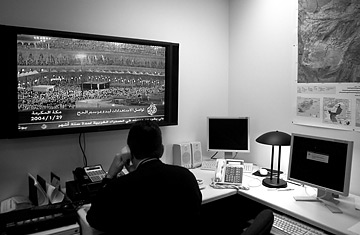
An agent works from his desk at CIA headquarters in Langley.
The CIA Inspector General's report declassified on Monday makes it painfully clear: We missed 9/11 because no one in Washington talks to each other.
It is a story that has been told over and over but bears repeating because it is at the heart of what went wrong in the lead up to that fateful day. In January 2000 a CIA field station in East Asia found out that two known Qaeda terrorists, Khalid al-Midhar and Nawaf al-Hazmi, were on their way to the United States — and they weren't coming on vacation. But it wouldn't be until August 2001 that CIA headquarters finally would tell the FBI, too late for the agency to track the two down.
During the eighteen months between January 2000 and August 2001 50 to 60 people at the CIA were aware of al-Hazmi and al-Midhar traveling to the U.S. But no one did anything because the assumption was that someone else had told the FBI. And presumably the FBI was covering the two.
One problem was that communications between FBI and CIA headquarters is ad hoc — usually by telephone, sometimes by a classified telex. An FBI agent assigned to the CIA wrote a telex to the FBI about al-Hazmi and al-Midhar but for reasons that are still unclear it was never sent. There was no mechanism to register the lapse, or that the FBI in fact did not have al-Midhar and al-Hazmi under coverage. The ball was dropped.
The problems were easily correctible. For instance, had the CIA field station in East Asia been able to send a telex directly to FBI headquarters in Washington or FBI field offices in California, where al-Hazmi and al-Midhar ended up, the FBI no doubt would have launched a full field investigation and almost certainly found out about the other 17 hijackers. The chances are the FBI would have stopped 9/11.
The CIA IG's report says there was no "silver bullet" that would have prevented 9/11. I disagree; this was it.
Al-Hazmi and al-Midhar falling between the cracks is not the stuff of conspiracies or simple incompetence. The CIA and the FBI are Cold War institutions that have never shared databases. Their communications systems were never designed to interface. FBI and CIA cultures have never meshed. The FBI collects evidence for trial, the CIA collects information to analyze it. No wonder leads are dropped.
And that is not the only Achilles' heel in the system. The CIA IG's report cites the National Security Agency's unwillingness to share raw intercepts with the CIA. Who knows what is in the NSA's raw databases on al-Midhar and al-Hazmi?
Blaming George Tenet or any other CIA manager for 9/11 lapses is to misunderstand the problem. Neither Tenet nor any other CIA director has ever had the mandate or the authority to force the NSA to share its raw databases with CIA analysts. Nor has any director had the mandate or authority to integrate FBI and CIA communications. This is the President and Congress' prerogative.
The CIA and the FBI are talking better these days, if for no other reason than the FBI and CIA understand what went wrong on 9/11. But the FBI still needs an intelligence division that deals in information rather than evidence. The NSA needs to find a system that allows other agencies to interrogate its databases or at least trace names using a computer. And the CIA needs to find a better way of disseminating its intelligence without compromising its sources.
Last week the Pentagon was talking about dumping $1 billion on private intelligence contractors. This gets us nothing, other than to drive up property prices in the Washington area. The NSA doesn't need a contractor to tell it how to let the CIA read its raw data.
Robert Baer, a former CIA field officer assigned to the Middle East, is TIME.com's intelligence columnist and the author of See No Evil and, most recently, the novel Blow the House Down.
